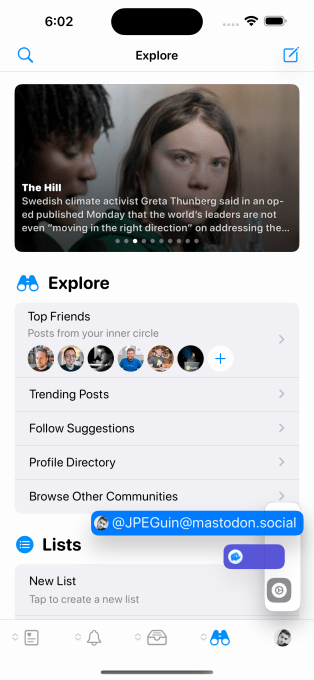
Mammoth, a recently launched Mastodon app that’s trying to make it easier on users who want to join the decentralized social web, has a notable financial backer. The visitor confirmed that its leading pre-seed investor is Mozilla, a proponent of the unshut web, which invested in the company’s first unstipulated round slantingly others, including Long Journey Ventures and Salesforce’s Marc Benioff.
The visitor has a unique founding story as well. The app was originally built by iOS developer Shihab Mehboob, the creator overdue a number of apps, including the whimsical music app Vinyls and the Twitter vendee Aviary 2. The latter was impacted by Elon Musk’s Twitter API changes, which put an end to third-party Twitter clients, prompting Mehboob to turn his sustentation to the decentralized and unshut source Twitter volitional Mastodon.
Mammoth was the result of those efforts, but it has since been uninventive by the visitor that’s now running the project, led by principal developer Bart Decrem.
Now, the team at Mammoth is just three full-time employees and a handful of contractors. And while the total investment round is undisclosed, Decrem characterized the pre-seed as a small value — “a million or two is the unstipulated round” at this stage, he says.
The new Mammoth founder’s preliminaries is both in unshut source and consumer apps, in wing to entrepreneurship.
In ’99, Decrem worked on a Linux startup tabbed Eazel which aimed to make Linux easier to use. While others on that project later ended up towers Safari and other technology at Apple, Decrem found himself at the Mozilla Foundation superiority of the Firefox 1.0 launch. There, he ran marketing and merchantry wires and worked on branding and the international launch. He was moreover a part of the search monetization discussions, including the initial Google search deal.
He later went on to increasingly entrepreneurial efforts including the VC-backed social web browser Flock (which received its pearly share of TechCrunch coverage when in the day), followed by an early smartphone game maker Tapulous, makers of Tap Tap Revenge. The latter landed him at Disney pursuit an acquisition, as the throne of the mobile games group, which put out products like the “Where’s My Water” series and some “Temple Run” titles.
Some of these prior efforts moreover involved the same tideway of finding and partnering with existing developers, Decrem notes, including the original Tap Tap Revenge developer. Later at Disney, he found a developer in QA who had built a No. 1 game on the App Store, but not under Disney’s branding. Decrem brought the developer into his group and gave him the space to create what became “Where’s My Water?,” a title that’s seen a billion-some downloads by now.
“The way I like to do things is you find somebody special and then get out of the way and support their vision,” Decrem explains. “I saw that spark in [Mammoth founder] Shihab [Mehboob], and that’s why we’re working together.”
The two were teamed up as Decrem was running a small lab that had been working on decentralization projects, including a crypto app tabbed KyrptoSign for legal documents on the blockchain, as well as an art collective. But when Mastodon came along, the team pivoted, uninventive Mammoth and now it’s the group’s only focus.

Image Credits: Mammoth
For Decrem, the request of Mastodon was not just that it’s an unshut source Twitter clone — something he said only felt “mildly interesting” — but how it was a place where communities were forming.
“It reminded me of Firefox 0.7, which is what I got involved in Mozilla — the Firefox launch,” Decrem says. “I was like, there’s just people nerding out here, doing tomfool shit…that feels heady and interesting and everything I like well-nigh the internet — communities towers and organizing themselves.”
“This thing is half microblogging, but half people organizing communities — like Reddit, or maybe like Discord,” he continues. “This is like a digitally native social system. And it’s decentralized. That’s freaking cool.”
Other companies seem to think it’s tomfool too. Today, Flipboard spoken it was joining the decentralized social web. Medium once has, and Tumblr said it would.
The challenge, of course, for Mammoth, will be not just making the decentralized social web increasingly well-flavored to increasingly newcomers but moreover successfully maintaining and generating revenue from the app itself. Decrem says the visitor plans to have a subscription plan misogynist in a few months that will range from $3-5 per month, at least half of which will likely go toward various Mastodon server bills.
But revenue is not the firsthand focus — growing its user wiring comes first. As for now, Mammoth has at least a year’s worth of funding thanks to Mozilla’s backing, Decrem says. And they’re willing to be patient, he notes.
Updated 2/28/23, 9:52 pm et to sieve the subscription funds would support other Mastodon servers not just its own.
Mozilla leads Mastodon app Mammoth’s pre-seed funding by Sarah Perez originally published on TechCrunch